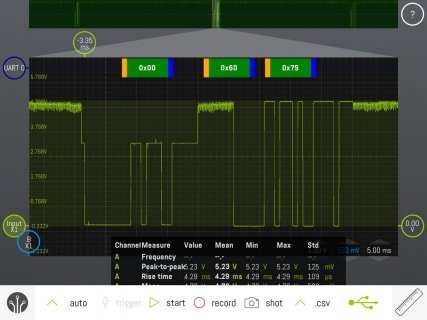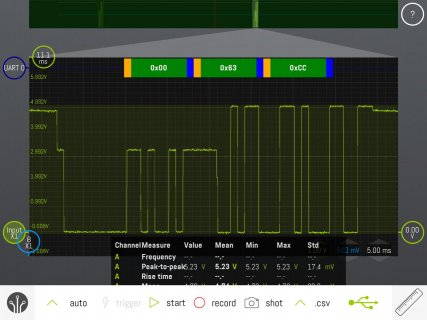TheNetStriker
New member
I'am trying to communicate with two device from the same manufacturer that seams to use a single wire UART serial port. (Sadly I don't have any documentation of the devices because the manufacturer does not release it)
I'am using a Teensy 3.2 and I've implemented this code to add the single wire serial port function. I setup the serial port with 1200 baud, two stop bits and no partity.
The first device works perfectly using only one pin for TX and RX. (note that the UART decoder of my oscillator is not perfect and does not recognize all bytes)
Here is a graph how the communication with this device looks like:

The first two bytes are sent from the Teensy, then there is a pause and then two bytes from the remote device are coming back. (The bytes from the remote device are also on a higher voltage)
As said this works perfectly and I can receive both bytes every time on the Teensy.
But on the second device the pause is much shorter and the Teensy often gets confused when reading this and reads only one or zero bytes. (And most of the time completely wrong one's)
Here is a graph how this looks like:

The first two bytes here are also from the Teensy and the second two bytes are from the remote device.
Is there any way to get such a communication to work on the Teensy reliable?
I'am using a Teensy 3.2 and I've implemented this code to add the single wire serial port function. I setup the serial port with 1200 baud, two stop bits and no partity.
The first device works perfectly using only one pin for TX and RX. (note that the UART decoder of my oscillator is not perfect and does not recognize all bytes)
Here is a graph how the communication with this device looks like:

The first two bytes are sent from the Teensy, then there is a pause and then two bytes from the remote device are coming back. (The bytes from the remote device are also on a higher voltage)
As said this works perfectly and I can receive both bytes every time on the Teensy.
But on the second device the pause is much shorter and the Teensy often gets confused when reading this and reads only one or zero bytes. (And most of the time completely wrong one's)
Here is a graph how this looks like:

The first two bytes here are also from the Teensy and the second two bytes are from the remote device.
Is there any way to get such a communication to work on the Teensy reliable?

